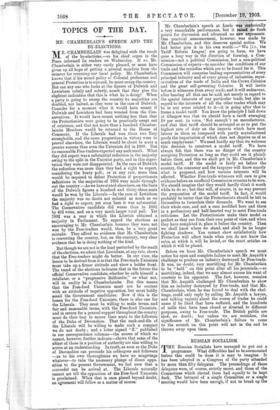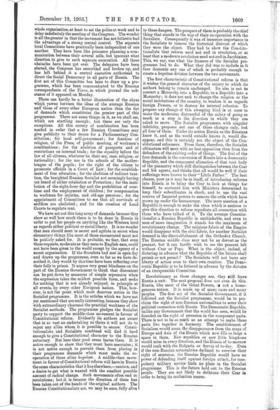RUSSIAN SOCIALISM.
THE Russian Socialists have managed to put out a programme. What difficulties had to be surmounted before this could be done it is easy to imagine. It has been adopted in a Congress of the party attended by more than fifty delegates. The proceedings of these delegates were, of course, strictly secret, and those of .the Committees which elected them had equally to be kept dark. The betrayal of a single Committee or a single meeting would have been enough, if not to break up the whole organisation, at least to set the police at work and to delay indefinitely the imeeting of the Congress. The wonder IS all the greater in that the movement has not hitherto had the advantage of a strong central control. The separate local Committees have practically been independent of one another. They have been like prisoners planning a com- munication between their several cells, but ignorant what direction to give to each separate excavation. All these obstacles have been got over. The delegates have been elected, the Congress has assembled and broken up, and has left behind it a central executive authorised to direct the Social Democracy in all parts of Russia. The first act of this Committee has been to draw up a pro- gramme, which has been communicated to the Russian correspondents of the Times, in which journal the sub- stance of it appeared on Monday.
There can hardly be a better illustration of the abyss which yawns between the ideas of the average Russian and those of every other European nation than the list of demands which constitutes the greater part of this programme. There are some things in it, as we shall see, which are startling enough ; but these are only the exceptions. All this secrecy of combination has been needed in order that a few Russian Committees may give publicity to their desire for a Parliamentary Con- . stitution ; for local self-government; for freedom of religion, of the Press, of public meeting, of workmen's combinations ; for the abolition of passports and of restrictions on internal trade ; for the equality before the law of all citizens, whatever be their sex, race, religion, or nationality ; for the use in the schools of the mother- tongue of the pupils ; for the right of the citizen to prosecute officials in a Court of Law ; for the establish- ment of free education; for the abolition of indirect taxa- tion, the benighted Russian Socialist not seemingly having yet heard of either retaliation or Protection ; for the insti- tution of the eight-hour day and the prohibition of over- time and the employment of children ; for compensation to workmen for injuries, and old-age pensions ; for the appointment of Committees to see that all survivals of serfdom are abolished ; and for the creation of Land Courts to regulate rent.
We have set out this long array of demands because they show so well how much there is to be done in Russia in order to put her people on anything like the Western level as regards either political or social liberty. It is no wonder that men should meet in secret and agitate in secret when elementary things like most of those enumerated must not be publicly asked for. It is probable, we fear, that even these requests, moderate as they seem to English ears, could not have been given to the world except by the agency of a secret organisation. If the Socialists had met in open day and drawn up the programme, even so far as we have de- scribed it, they would by this time have been reflecting over their folly in prison. It argues very great blindness on the part of the Russian Government to think that discontent can be put down by measures of simple repression when the expression takes the mildest possible form, and seeks for nothing that is not already enjoyed, in principle at all events, by every other European nation. This, how- ever, is not the point which most deserves notice in the Socialist programme. It is the articles which we have not yet mentioned that are really interesting, because they show with extraordinary clearness the practical weakness of the Socialist methods. The programme pledges the Socialist party to support the middle-class movement in favour of Constitutional reform. Evidently its authors are aware that in so vast an undertaking as theirs it will not do to reject any allies whom it is possible to secure. Consti- tutionalists and Socialists combined will find it hard enough to give a Constitutional character to the Russian autocracy. But here their good sense leaves them. It is active enough to show that they must have associates ; it is not active enough to prevent them from placing in -their programme demands which must make the co- operation of these allies hopeless. A middle-class move- ment in favour of Constitutional reform will have in Russia the same characteristics that it has elsewhere,--caution, and a desire to get what is wanted with the smallest possible amount of radical change. Such movements often end in revolutions; but it is because the direction of them has been taken out of the hands of the original authors. The Russian Constitutionalists are, we may be sure, fully alive to these dangers. The prospect of them is probably the chief thing that stands in the way of their co-operation with the Socialists. Consequently it was of immense importance to the Socialists to remove the historical distrust of which they were the object. They had to show the Constitu- tionalists that reform need not end in revolution, or at least that a moderate revolution need not end in Jacobinism. This, we say, was what the framers of the Socialist pro- gramme bad to do. What they did was to include in it four demands any one of which is probably enough to create a hopeless division between the two movements.
The first characteristic of Constitutional reform is that it wishes the general character of the society to which its author's belong to remain unchanged. Its aim is not to convert a Monarchy into a Republic, or a Republic into a Monarchy ; it does not seek to change the religion or the social institutions of the country, to weaken it as regards foreign Powers, or to destroy its internal cohesion. To propose any change of this sweeping kind is at once to make the moderates distrustful of the safety of going so much as a step in the direction in which they are asked to move. The Socialist programme, with singular infelicity, proposes not one of these changes only, but all four of them. Under its action Russia as the Russians know it, and as the world outside knows it, would dis- appear, and this is certainly not the object of the Con- stitutional reformers. From them, therefore, the Socialist ultimatum will meet with no less opposition than from the defenders of the existing order of things. The first of the four demands is the conversion of Russia into a democratic Republic, and the consequent alienation of that vast body of the peasantry which still distinguishes between the Czar and his agents, and thinks that all would be well if their sufferings were known to their " Little Father." The best chance, poor as it may be in itself, of introducing reforms into Russia is to bring the Czar to look at things for himself, to surround him with Ministers determined to keep their subordinates in check, and to use the vast reserve of Imperial powers to remove the evils which have grown up under the bureaucracy. The mere mention of a Republic is enough to make the class which is anxious to give this direction to reform repudiate all connection with those who have talked of it. To the average Constitu- tionalist a Russian Republic is unthinkable, and even to men of more imagination it stands for the maximum of revolutionary change. The religious fabric of the Empire would disappear with the civil fabric, for another Socialist demand is the disestabhshment of the Orthodox Church. The Russian middle class may not be as devout as the peasant, but it can hardly wish to see the peasant left without Czar or Pope. What is the object, indeed, of dictating in advance what the Republic of the future shall permit or not permit ? The Socialists will not leave any liberty of action even to their own creation. The Demo- cratic Republic is to be fettered in advance by the dictates of an irresponsible Committee.
Revolutionary as these changes are, they still leave Russia a unit. The next proposal does not even do this. Russia, like most of the Great Powers, is not a homo- geneous nation. It is made up of many races and many peoples. The first act of the Socialist Government, if it followed out the Socialist programme, would be to pro- claim the right of non-Russian nationalities to sever their political connection with Russia. The Democratic Republic, unlike any Government that the world has seen, would be founded on the right of secession in the component parts. There is not to be so much as an attempt to make these parts live together in harmony. The establishment of Socialism would mean the disappearance from the maps of Europe and Asia of the Russia which now fills so large a space in them. New republics or new little kingdoms would arise in every direction, and the Russia, of to-morrow would rank with the Bulgaria or Servia of to-day. Even if the non-Russian nationalities declined to exercise their right of secession, the Russian Republic would have no power of defending itself against foreian attack, for com- pulsory military service finds no place in the Socialist programme. This is the future held out to the Russian people. They are not likely to dethrone their Czar in order to bring its realisation nearer.



















































 Previous page
Previous page